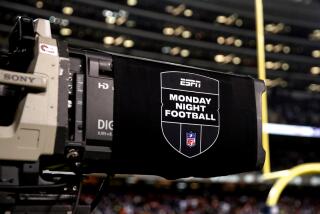Cable TV outlook bright, but rising costs a big problem, analysts say
Wall Street is betting that the cable industry will successfully navigate an increasingly competitive landscape.
On Tuesday, top financial analysts gave a mostly upbeat assessment of the industry.
To be sure, Wall Street banks have done well this year because of the flurry of mergers and acquisitions, much of it emanating from Philadelphia.
In February, Comcast struck a $45-billion deal to acquire Time Warner Cable and, this week, Comcast and Charter Communications formed an alliance to divide up cable markets and spin-off a new entity.
“It’s hard to look at this and not be positive,” Jessica Reif Cohen, a Bank of America Merrill Lynch managing director, said of Comcast’s deal-making during a panel discussion at the National Cable & Telecommunications Assn.
“Comcast will be a major player in the top 50 markets,” she said, adding that should help create more of a national advertising model that has existed.
The emergence of Netflix, Google, Amazon.com and other technology firms also has served as a wake-up call for the industry.
Netflix’s explosive growth -- and the high marks it gets from its customers -- has prodded cable TV operators to spend huge sums of money during the last two to three years to upgrade their networks, video-on-demand offerings and on-screen viewer guides.
Google’s rollout of its super high-speed Google Fiber broadband network might be intended as little more than a “whip” to encourage the traditional telecommunications and cable operators to upgrade their own networks to send more data into homes -- or they risk the threat of Google moving into local communities to offer lower-cost and higher-speed broadband services.
“I don’t expect them to really dig up flower beds on a major scale,” JP Morgan managing director Philip Cusick said.
In other words, Cusick doesn’t believe that Google intends to spend the billions of dollars that it would take to lay the fiber lines necessary to build a national footprint for broadband on the scale of an AT&T, Verizon, Comcast, Cox Communications or Charter.
The biggest threat to the industry appears to be coming from within. Growing programming costs and constantly rising cable TV bills appear to be a bigger challenge facing the industry than threats posed by powers from Silicon Valley.
“Cord-cutting is real. It’s not much of a debate any longer,” said Craig Moffett, senior analyst and partner of the research firm MoffettNathanson.
Although millions of people have not canceled their cable subscription, Moffett said, the rising cost of cable TV subscriptions is increasing the likelihood that more people will drop their pay-TV service.
And the more people that cancel their subscriptions, the larger the opportunity is for new companies to enter the space to target this growing group of consumers.
“The bigger the price gets for pay TV the bigger the opportunity is for alternatives,” Moffett said.
An explosion in the number of TV channels offered and the ever-increasing fees charged by programmers to the pay-TV distributors has contributed to the inflation. There also seems to be a feeling by some in the industry, and some on Wall Street, that companies will be able to add more features and services, such as home security, to persuade consumers to pay more.
But Moffett didn’t sound convinced.
“It’s an industry that is heading for the cliff, and the faster we get to it, the more we step on the accelerator,” Moffett said.
ALSO:
Comcast pushes back on Netflix; defends TW Cable deal in FCC filing
Mayor Garcetti calls on Time Warner Cable to get Dodgers deals done
Comcast, Charter reach $20 billion deal; would swap customers in LA
Twitter:@MegJamesLAT
More to Read
From the Oscars to the Emmys.
Get the Envelope newsletter for exclusive awards season coverage, behind-the-scenes stories from the Envelope podcast and columnist Glenn Whipp’s must-read analysis.
You may occasionally receive promotional content from the Los Angeles Times.







